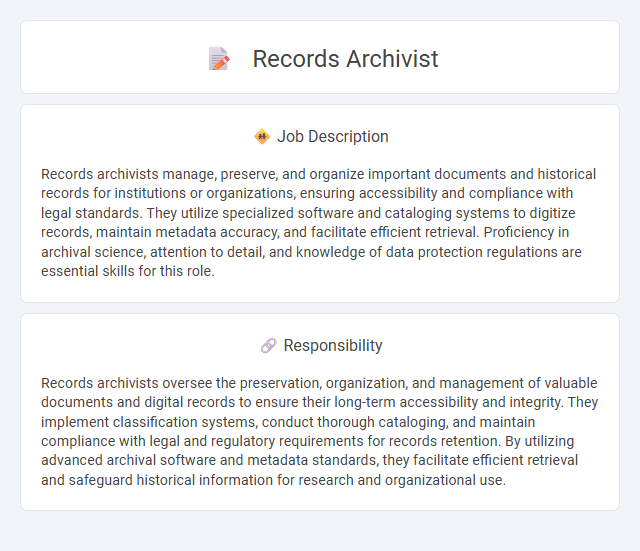
Records archivists manage, preserve, and organize important documents and historical records for institutions or organizations, ensuring accessibility and compliance with legal standards. They utilize specialized software and cataloging systems to digitize records, maintain metadata accuracy, and facilitate efficient retrieval. Proficiency in archival science, attention to detail, and knowledge of data protection regulations are essential skills for this role.
Individuals with strong attention to detail and an interest in history or information management are likely to be well-suited for a records archivist job. Those who prefer structured environments and have patience for sorting, organizing, and preserving documents may find satisfaction in this role. Conversely, people who struggle with repetitive tasks or need high social interaction might find the position less suitable.
Qualification
Records archivists require a bachelor's degree in history, library science, information management, or a related field, with many employers preferring a master's degree in archival studies or public history. Proficiency in digital archiving software, knowledge of metadata standards such as Dublin Core, and strong organizational skills are essential for managing and preserving physical and electronic records. Experience with records management policies, attention to detail, and familiarity with legal compliance in document retention are critical qualifications for success in this role.
Responsibility
Records archivists oversee the preservation, organization, and management of valuable documents and digital records to ensure their long-term accessibility and integrity. They implement classification systems, conduct thorough cataloging, and maintain compliance with legal and regulatory requirements for records retention. By utilizing advanced archival software and metadata standards, they facilitate efficient retrieval and safeguard historical information for research and organizational use.
Benefit
Records archivist jobs likely offer significant benefits such as preserving important historical documents and contributing to organizational efficiency. The role may provide opportunities for career growth in information management and digital archiving. There might also be a stable work environment with benefits including health insurance and retirement plans.
Challenge
Records archivists likely face significant challenges in managing vast volumes of diverse and often fragile materials, requiring meticulous attention to detail and advanced organizational skills. The probability of encountering complex legal and privacy issues is high, demanding thorough knowledge of compliance standards and data protection regulations. Adapting to rapidly evolving digital technologies may also present ongoing difficulties in preserving and providing access to electronic records.
Career Advancement
Records archivists play a crucial role in preserving and managing historical documents and digital records, offering opportunities for specialization in areas such as digital archiving or preservation technology. Advancing in this career often involves obtaining certifications like the Certified Archivist credential from the Academy of Certified Archivists and developing expertise in information management systems or archival software. Leadership positions, such as archives manager or curator, typically require advanced degrees in library science, archival studies, or related fields, combined with extensive experience in records organization and regulatory compliance.
 kuljobs.com
kuljobs.com